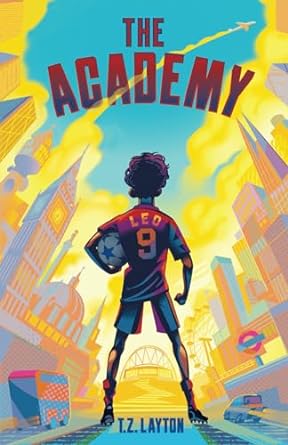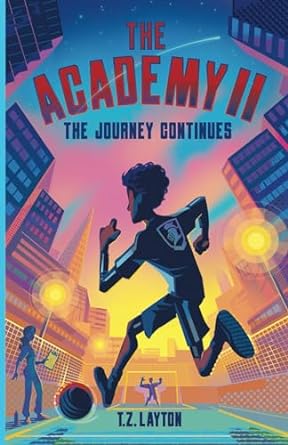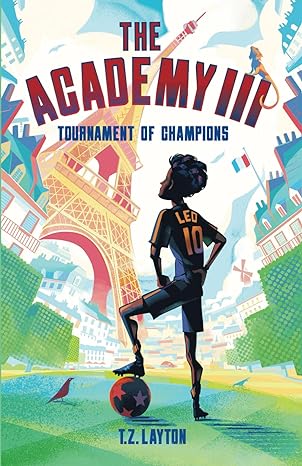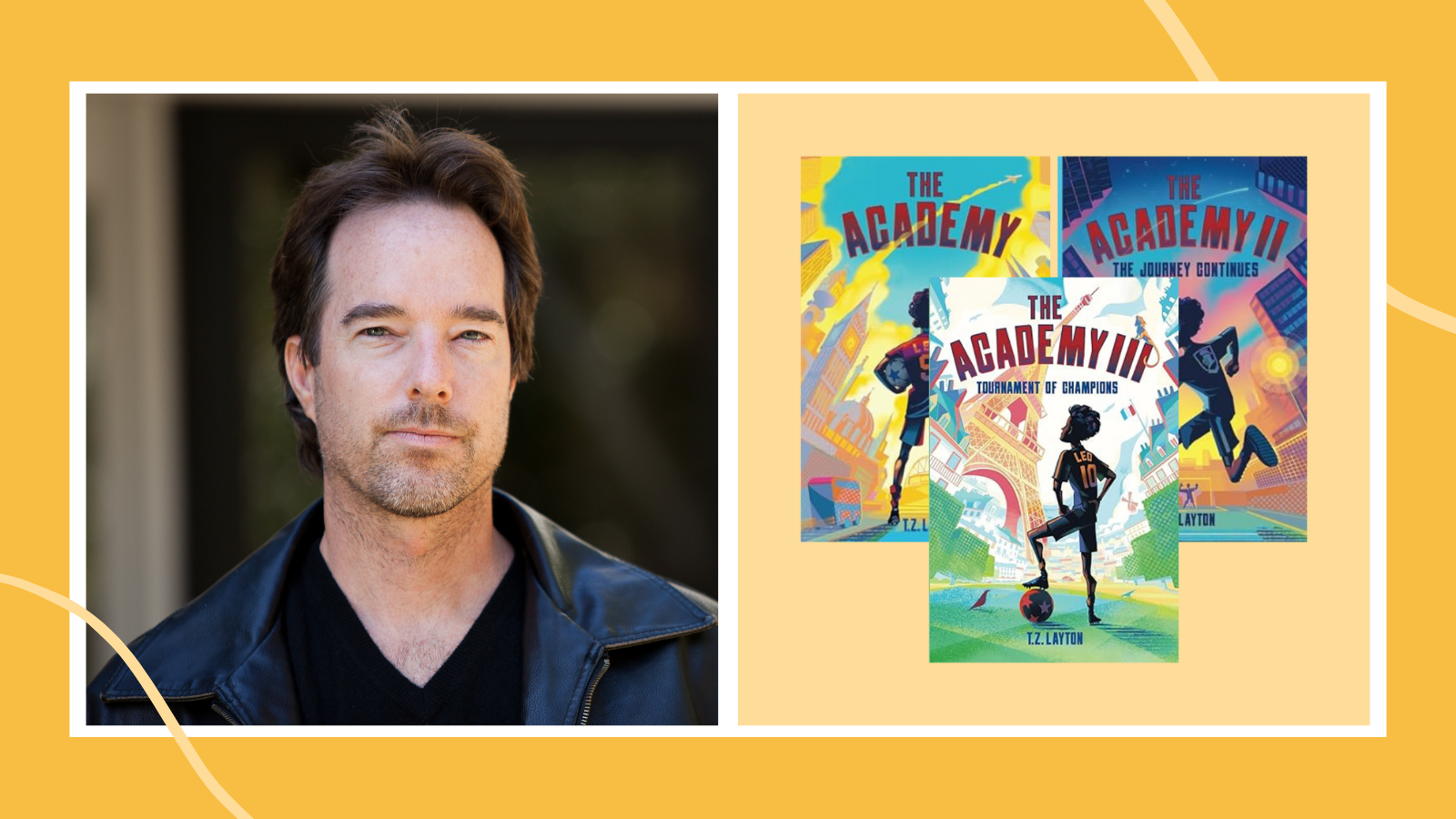As a teacher and parent, I’m constantly on the lookout for the next book series for kids that will keep—or get—them excited about reading. The Academy Series by T.Z. Layton is my go-to for 5th grade boys or any upper elementary kids who love sports.
The Academy Series features Leo, a 12-year-old soccer player from Ohio. By a huge stroke of luck, he gets noticed by a scout from the English Premier League, who invites him to a summer training camp in London. This launches Leo on a wild journey into the world of pro soccer. (True story: My own kids talked about the series so much that even their great-grandfather, a devoted Premier League fan, decided he had to read the first book so he could be part of the dinner table conversation.) When kids started asking me questions about author T.Z. Layton and how he created such a fun series, I had to get in touch with the author to find out more!
What inspired the Academy series?

T.Z. Layton is the pen name that author Layton Green uses when he writes books for kids. He writes mostly mystery, thriller, and fantasy novels for adults but acknowledges, “That might be changing!” due to the success of the Academy books. His son and his soccer team inspired the series, Layton says. When his son was 10, he asked his dad for a soccer story. The shortage of middle grade soccer novels available, especially those starring boys, surprised Layton. “Sports books were one of the earliest things I read that led me into reading,” he says, “and I said, well, maybe I’ll just write one!” He wrote the first book for fun. But when his son loved it, and his teammates did too, Layton decided to publish it and make it a series.
Meet Leo K. Doyle
The main character of the series, Leo, was loosely inspired by Layton’s son, as well as Layton’s own childhood. Since Layton’s wife is Zimbabwean, his son is biracial and bicultural, just like Leo. “I wanted a book that spoke to a lot of kids, so I purposely made Leo someone every kid could look at and see a little bit of themselves.”
Layton now lives in California, but he grew up in a small town in Kentucky on the border of Ohio, and he decided to write from his experience coming from “the middle of nowhere.” Layton wanted to characterize Leo as “an everyday kid,” so like many kids today, Leo’s family “struggles a little bit in a hard economy.” Also like many kids, Leo loves eating junk food, playing video games, and his pet lizard named Messi, in addition to soccer.
What do readers think?

“There’s no greater honor as an author than your book impacting a child,” Layton says. “Kids want to read about their interests,” he says, and the feedback on this series has been “incredible and overwhelming.” He’s received hundreds of emails about how this series turned kids into avid readers—and even photos of kids dressed up as Leo for Halloween!
The first three titles in the Academy series hold the #1, #4, and #5 spots on Amazon for bestselling children’s soccer books, among a collection of nonfiction titles. Sports fiction books for kids around the 5th grade level are always in demand—these readers have moved past early chapter book series but may not be quite ready for the heavier themes of young adult books. Books in this sweet spot can be surprisingly hard to find.
Many popular sports fiction titles, like those by Matt Christopher, have been around for decades. While they’re timeless in some ways, they don’t exactly feel fresh. (Raise your hand if you’ve had to explain to a kid the thrill of finding a prize in a cereal box, listening to a sports game on the radio, or any other reference to life as a kid in decades gone by.) Layton says that while he loves Matt Christopher, “We do need modern books to keep kids engaged.”
Soccer, soccer, soccer
Layton’s life experience helps him weave lots of soccer information into the Academy books. “I played college soccer, grew up with soccer, love soccer, and watch it all the time.” He also says, “Being around my son and his teammates, I knew how much they knew about soccer. Having kids of this age makes it easy for me to make [the books] more authentic.”
Layton admits that while he was writing the first book, he wasn’t confident that all kids would enjoy the extended soccer game scenes. His readers surprised him. He says that, “All the time, kids tell me their favorite parts are the really detailed descriptions of the games.” Before publication, Layton test-reads the books to his younger daughter, who’s not an avid soccer fan, and even she loves the long game scenes.
About how plausible Leo’s experiences are being selected for a Premier League development program, he said, “These things are happening. It’s very real,” and mentioned 14-year-old Cavan Sullivan from Philadelphia, who just signed a multimillion-dollar contract to play for Manchester City when he turns 18. In the first book, Leo attends the training academy for the London Dragons, a fictional Premier League team. As a former lawyer, Layton was extra careful not to misrepresent any actual teams in his fictional novels, though he does mention famous real-life teams and players throughout the stories.
Why teachers love this book series for kids
These titles are a surefire recommendation for any reluctant middle grade reader who’s remotely into sports. But kids, parents, teachers, and librarians also love them because they look at relatable themes through a hopeful lens. Leo has to navigate friendships and bullying in the context of intense competition. He interacts with a variety of coaches, some of whom he greatly respects and some whose unfair behavior will have readers protesting. Throughout all the books, he has to figure out how to work hard to make the most of his opportunities and reach his goals.
The excitement of the soccer scenes makes these titles ideal for reading aloud or helping kids practice reading with expression. They’re lively demonstrations for kid writers of how to hook readers with suspense, and use compelling details to bring scenes to life. Their journal-entry format makes them helpful examples of personal narrative writing.
T.Z. Layton’s advice for kid authors
For kids who want to write fiction, especially sports fiction, T.Z. Layton offers some sound advice: “I give the same advice to kids and adults. Read, write, and live. Read as widely as you can, practice writing as much as you can, and live your life, because your fiction comes through your life experiences. You have to experience the world to be able to write about it.” For kids who aren’t sure where to start with writing assignments, he says, “Write about both plots and characters that interest you. It has to be fun for you or you’re not going to want to do it.”
What’s next for T.Z. Layton?
Kids will be happy to hear that the fourth book, called “Academy IV: Title Fight,” will be released in summer 2024. Layton plans to write a total of eight books in the series. He hopes to take Leo to age 16, “to see if he can get that coveted pro contract.” (He’s also sold the TV rights to the series, though there are no firm plans for taking Leo on-screen yet.)
Layton appreciates hearing from readers via his website. He has a specific request for them: “I love feedback on which characters readers love. That informed some of my early choices of who to keep and who not to keep. I want to give kids continuity among the characters they like.”
Here are the Academy books released so far:

Buy it: The Academy on Amazon

Buy it: The Academy II: The Journey Continues on Amazon

Buy it: The Academy III: Tournament of Champions on Amazon

